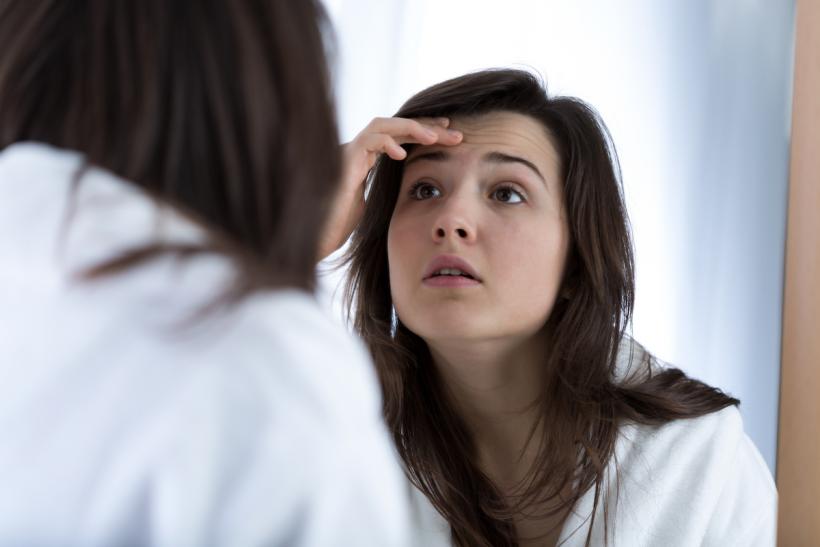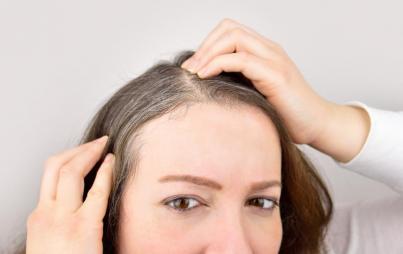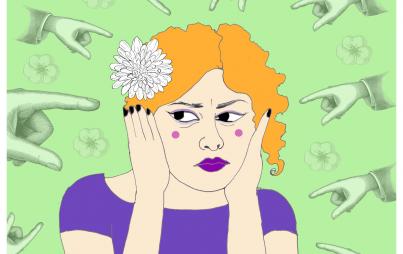
I have to reject self-loathing when it arrives in the guise of self-care, and that means I have to opt out of skin care culture.
This article first appeared on Role Reboot and has been republished with permission.
I was 17, sitting on the porch outside my favorite café with some friends, when a man walked up to us — to me. “Hey,” he said in a friendly voice. “You’ve got really bad acne.”
My neutral “can I help you?” smile froze on my face. My friends kept chatting among themselves as though nothing was happening. He interpreted my silence as an invitation to keep going. “You should change your sheets more often,” he said. “If your pillowcases are clean, you won’t get dirt in your pores and break out.”
“Thanks,” I said through clenched teeth. I hated myself for saying it, for playing into the pretense that he was doing me a kindness. But I couldn’t think of anything else to say. I just wanted him to go away so badly.
“No problem,” he said, the very spirit of philanthropy, and walked away, leaving me smothered in shame, feeling sick, feeling unclean.
Today I know that what he did, which he probably forgot about in the next hour but which has lingered in humiliating detail in my memory for 13 years, was called concern trolling.
It’s a passive-aggressive form of shaming that masquerades as trying to help, but its goal is to subtly undermine you and make you feel like shit.
I first heard the phrase “concern trolling” as a college student, when I discovered the world of fat-positive activism. Through a wonderful network of feminist blogs with a body-liberation bent, I came to the epiphany that my plus-sized body was not a problem to be solved. I realized that I didn’t have to lose weight to be valuable, healthy, or even attractive. Over time and with practice, I developed the ability to tune out messages equating body fat with all things unsightly and unspeakable. I began describing my body as “fat” without judgment or shame; it was just another adjective that applied to me, like “short” and “white” and “queer.”
You Might Also Like: Can You Enjoy The Beauty Industry Without Hating Yourself?
In the decade plus that’s elapsed since my introduction to fat positivity, many of those concepts have made their way into the mainstream of American culture, albeit in a somewhat less radical form. Fat-shaming and other attacks on the dignity and safety of larger bodies are increasingly recognized and called out as shitty behavior. Size-based prejudice isn’t vanquished, of course, but it’s becoming more and more possible to acknowledge and fight it openly, rather than silently internalizing the stigma.
I was incredibly fortunate to encounter, at an early age, writers and artists and activists who truly believed that the shape of my body was not a moral or aesthetic failing, and who helped me believe it too. I wish so much that someone had said the same thing about my skin.
I don’t flinch from describing myself as fat. I do, however, take every detour I can around describing myself in other ways.
I wish I had the vocabulary to talk about my skin without value judgments, the way I talk about my weight.
I don’t have a “bad body,” I have a fat body, and that’s fine. But I don’t know how to describe my skin without saying “bad,” or how to describe the skin I wish I had without saying “good.” I don’t like to talk about my acne. Or my acne scars. Or, frankly, my skin in general. But lately it seems like that’s all anyone wants to do.
The rising popularity of skin care, not just as a beauty product but as a way of life, is quite frankly really fucking with me. So much of my online social circle — which, as a work-from-home parent, is the main social circle I have — has recently been given over to discussions of peels and serums, double-cleansing and The Ordinary, and I’m simultaneously tempted and repulsed by all of it. I resent the ubiquity of skincare culture because every damn time, it calls up that voice in my head saying I should just try it, just go to Sephora and buy something, maybe it would work this time, maybe I could finally be pretty.
When my friends are comparing their smooth complexion and invisible pores, I always wonder what they must think of my face — acne-scarred, collecting crow’s feet, and still breaking out regularly.
It’s hard to convince myself that the scrutiny other women apply to themselves doesn’t spill over onto me, the same way it triggers vicious insecurities to hear a size six friend complain about her love handles.
I never undertook crash diets or otherwise endangered my health for the sake of becoming thinner (I am fortunate that, as someone who fluctuates between about size 12 and size 18, the pressure to lose weight is much less targeted and aggressive than it is for people with larger bodies), but I did spend years trying to have better skin. I bought every “blemish-fighting” scrub on the shelf, prescription-strength topical treatments that made me burn and peel if I spent five minutes in the sun, the expensive sunscreen that wasn’t supposed to clog pores but definitely did. I went several rounds with Proactiv, and then of course there was the Accutane, which gave me nosebleeds and required monthly blood tests to make sure I wasn’t pregnant. Accutane made me miserable, but it worked for a while, and I hate the part of myself that still kind of wants to try it again.
People talk about skin care like it’s fun — like it’s a hobby, a “me time” activity, a way to relax. But for me, the very idea opens onto a black hole of self-loathing. I just plain don’t want to think about my skin that much. And I hate the beauty culture that makes me feel like that sentence isn’t enough on its own.
I don’t want to take anything away that brings another person joy, and I love the fact that “getting into skincare” empowers some people to lavish love and attention upon themselves. I feel petty for complaining that it makes me feel vulnerable and catalyzes my self-loathing — after all, if I don’t want to be ugly, couldn’t I just work harder to be beautiful? That voice again. There are a million skin care products on the market. Surely one of them would work for me.
But that voice doesn’t come from a place of self-compassion. For me, there is no compromising with the part of me that hates my skin, that inner monologue that still berates me until tears well up when I see photographs from middle school. I can’t appease that voice. I have to shut it out entirely. I cannot simultaneously love myself and do the labor of trying to make myself worthy of love. I have to reject self-loathing when it arrives in the guise of self-care, and that means I have to opt out of skincare culture. And if you need to, you can too.







